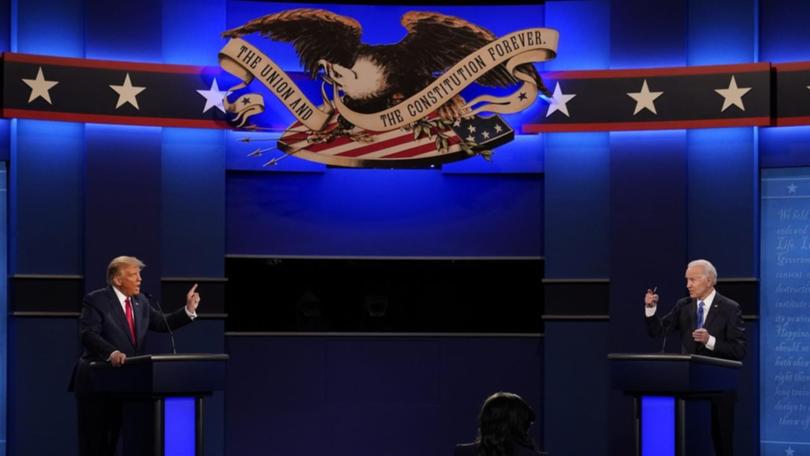Biden and Trump agree to debate in June and September
The US presidential campaigns of Joe Biden and Donald Trump have signalled their agreement to debate.

US President Joe Biden and Republican rival Donald Trump have agreed to face off in two debates on June 27 and September 10, setting up the highest stakes moments yet of the race for the White House.
“As you said: anywhere, any time, any place,” Biden said on social media.
Trump called Biden “the worst debater” he has ever faced.
Sign up to The Nightly's newsletters.
Get the first look at the digital newspaper, curated daily stories and breaking headlines delivered to your inbox.
By continuing you agree to our Terms and Privacy Policy.“I am Ready and Willing to Debate Crooked Joe at the two proposed times in June and September,” he posted on social media.
CNN, a division of Warner Bros Discovery, said the first debate would be held in their Atlanta studio with no audience, and would be moderated by anchors Jake Tapper and Dana Bash.
Georgia is one of November’s most closely contested states.
The candidates also accepted an invitation from US TV station ABC, which will host a second debate on September 10.
A separate vice presidential debate has been proposed for July, after the Republican National Convention.
Key differences between the two sides remained on the terms of engagement.
Biden said he would participate in those two debates under strict rules to reduce interruptions, while Trump called for more than two - and a very large venue “for excitement purposes”.
Debates, which will draw a US live television audience in the tens of millions, are fraught with risks for both candidates, who face a tight race and low enthusiasm from voters.
Biden aides think debates could hurt Trump by exposing his positions on issues, including abortion, that they regard as political vulnerabilities.
Trump aides see Biden as prone to verbal slip-ups that could amplify voter concerns about the 81-year-old president’s age.
Trump will be 78 by the time the first debate is held.
“Both candidates will be under greater scrutiny than they have ever been due to their age,” said Alan Schroeder, a professor emeritus at Northeastern University who wrote the book Presidential Debates: Risky Business on the Campaign Trial.
He called the debate “one of the only moments in which the candidates don’t have complete control”.
The first debate would take place after the June 15 conclusion of the G7 summit in Italy and Trump’s criminal trial in New York.
Biden’s debate proposal, the first formal offer by his campaign, ditched the decades-old tradition of three autumn debates and called for direct negotiations between the Trump and Biden campaigns over the rules.
Asked about any preference for format or topics, Biden-Harris campaign spokesman Michael Tyler said some details remained to be worked out.
The move to accept debates shows Biden is willing to take a calculated risk to boost his opinion poll numbers in a race in which he is trailing Trump in key battleground states.
In addition to his age, voters remain concerned about Biden’s handling of the economy.
Trump, who refused to debate his rivals during the Republican nominating race, has in recent weeks been challenging Biden to a one-on-one match-up with him, arguing that debates should be held before early voting begins in some states.
He told conservative radio host Hugh Hewitt the debate should be two hours long and that both men should be required to stand.
Biden’s team earlier requested that only broadcast networks that hosted Republican primary debates in 2016 and Democratic primary debates in 2020 be eligible to host this year.
Only four networks hosted debates for both parties during those election cycles: CNN, Telemundo, CBS News and ABC News.
The Biden team showed no signs of accepting Trump’s invitation for more debates.
A Biden campaign spokesperson did not respond to a request for comment on the issue.
Biden said he would not take part in the traditional televised showdowns organised by the Commission on Presidential Debates, rejecting the non-partisan organisation that has managed them since 1988.
Trump had also expressed interest in bypassing the commission, and the Republican National Committee announced in 2022 that the party would leave the commission’s debate system altogether.
In a letter explaining the decision, Biden’s campaign chair Jennifer O’Malley Dillon cited the commission’s past struggles to keep candidates from violating debate rules.
She notified the commission that Biden will not be participating in the three general-election debates sponsored by the group, which are scheduled for September 16, October 1 and October 9.
The commission could not be reached for a comment.
Biden’s campaign also pressed for a debate that would occur before early voting started and without the participation of Robert F Kennedy Jr or any other independent or third-party candidates.
“They are trying to exclude me from their debate because they are afraid I would win,” Kennedy said on social media.
